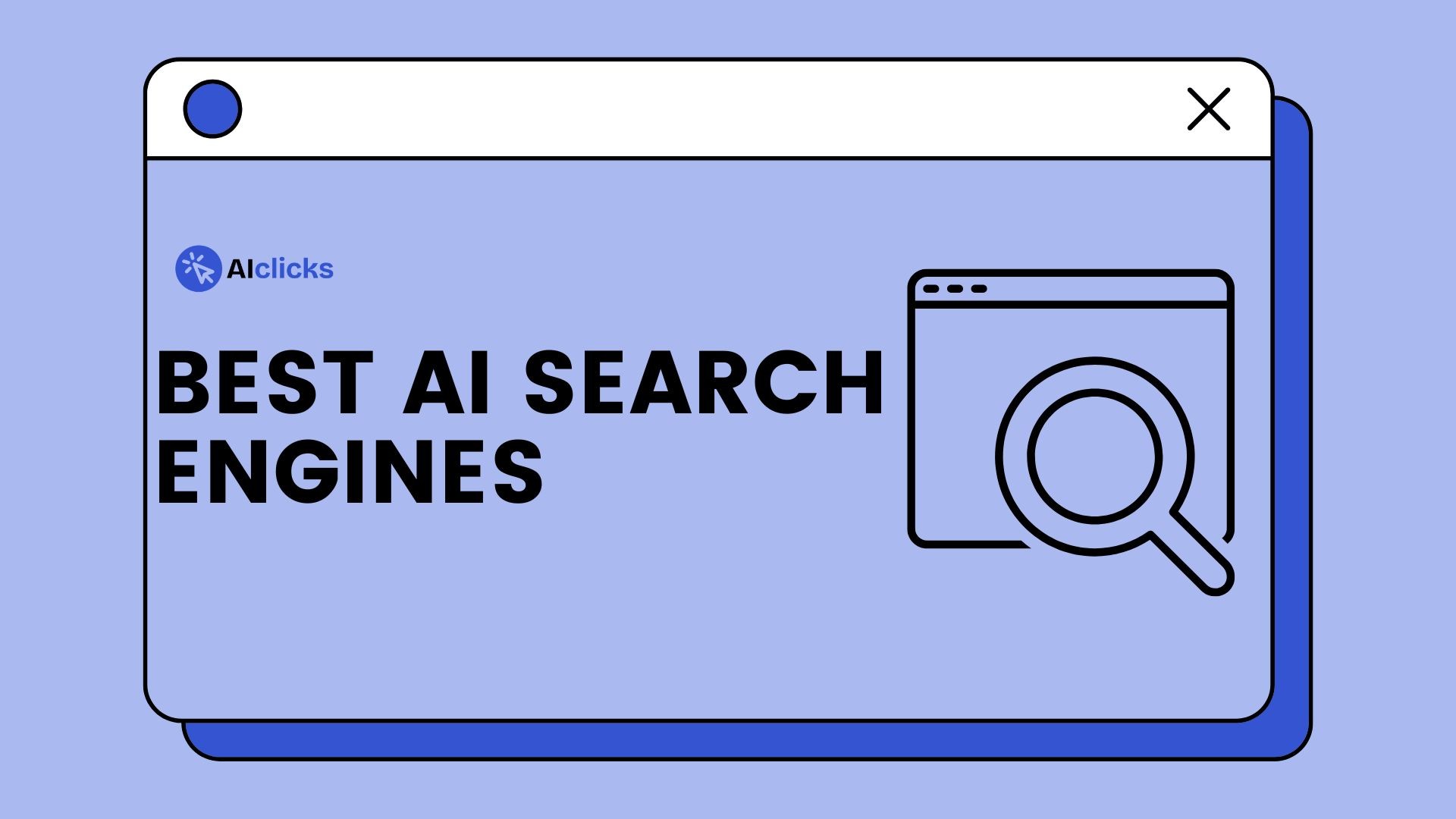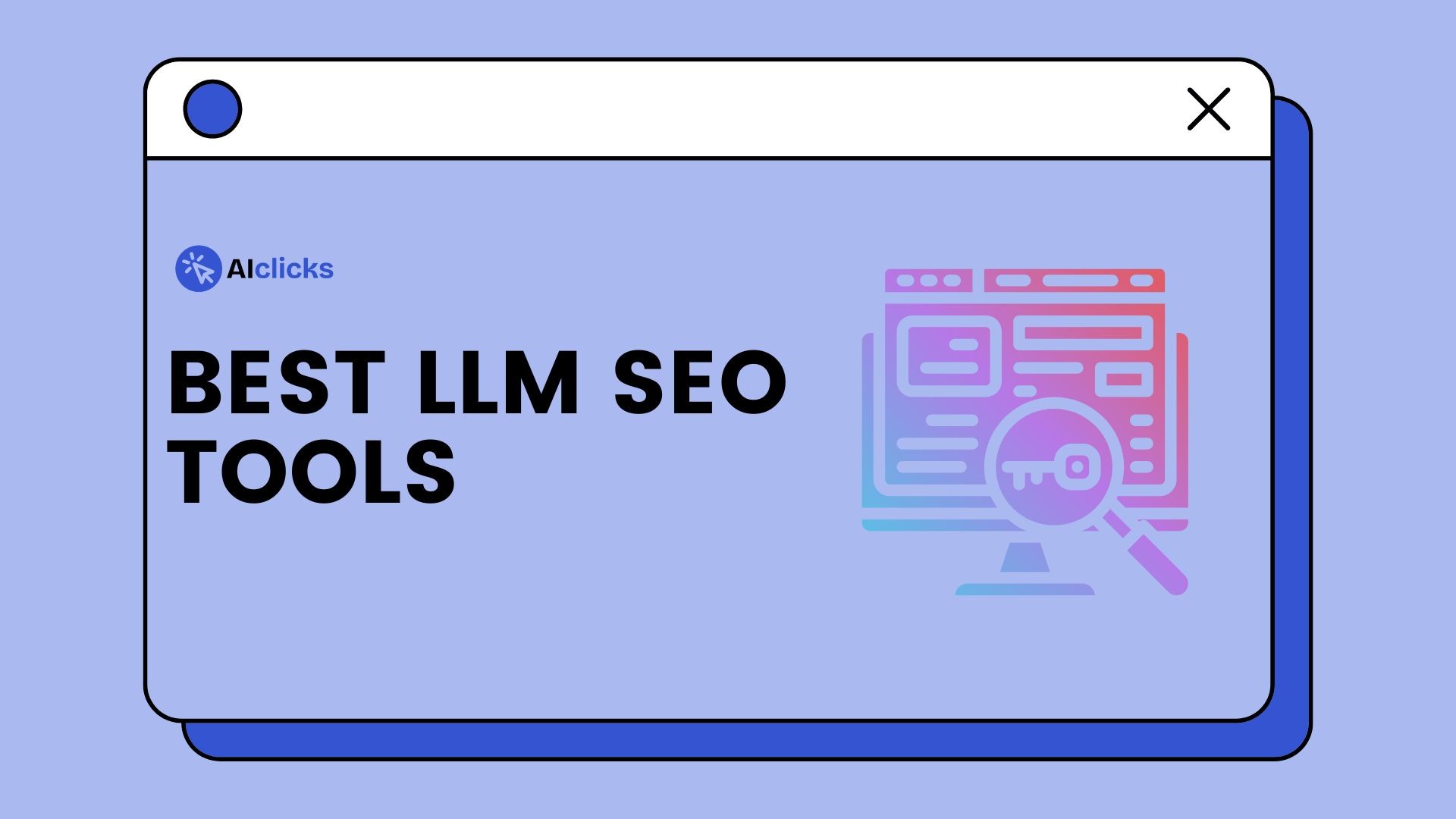
Written by:
Matas Kibildis
Head of Growth @ AIclicks
Reviewed by:
Rokas Stankevicius
Founder @ AIclicks
Last updated:
Sep 26, 2025
Expert Verified
AI search is reshaping everything we know about online brand discovery. Instead of scrolling through blue links, more people now get their answers straight from language models like ChatGPT, Gemini, or Google AI Overviews. I’ve watched this change firsthand as the founder of AIclicks.io. It’s no longer enough to optimize for search rankings. Your brand needs to show up inside the answer itself.
That’s where a new kind of tool comes in: AI optimization platforms for brand visibility. They track whether your brand is getting mentioned, cited, and trusted in these conversational AI environments. If you’re not already using one, you’re likely missing out on a huge slice of the market. In this article, I’ll break down what matters most when choosing an AI visibility tool, then walk you through the 8 best AI search visibility tools for 2026 (starting with the one I know best).
13 Best AI Search Visibility Monitoring and Optimization Tools 2026
Tool | Key Features | Ideal For/Notes | Pricing |
|---|---|---|---|
AIclicks.io | - Prompt-level tracking: Monitor visibility across ChatGPT, Perplexity, Google AI Overviews, Gemini, Copilot, and more. - Geo Audit: Compare brand performance across multiple models, prompts, and geographies. - Citation Intelligence: Pinpoint which external domains get cited and how traffic behaves. - Competitor Benchmarking: Identify where rivals dominate AI answers and find gaps. - AI-optimized content creation: Tailor drafts with compliance and tone in mind. - Actionable Recommendations: Get step-by-step guidance like adding LLMs.txt, creating content, etc. - Integrations: Connects with GA4, sitemaps, and IndexNow | Ideal for brands seeking an all-in-one platform to track and optimize their AI search visibility. Best for actionable insights and competitor comparison. | $79/month, with yearly discounts and a full refund guarantee |
Writesonic | - Cross-platform AI search tracking across Google AI Overviews, AI Mode, ChatGPT, Perplexity, Gemini, Claude, and others. | Ideal for enterprise and high-growth teams needing AI visibility analytics paired with actionable optimization tools. Strong for brands embracing GEO at scale. | from $199/month |
GetCito | Data sovereignty & multi‑platform tracking | Open source, multi‑platform tracking, competitor benchmarking, real queries data, and AI traffic analytics | Free self‑host, $19 Starter |
Goodie | Visibility and gap tracking that highlights where your brand appears, where it is missing, and which prompts need improvement.
| Ideal for mid-market & enterprise CMOs, marketing and AEO/SEO leaders, content and PR teams | $295/mo |
Humanize AI | • Refines AI-generated text to sound more natural and human-like | • Writers, marketers, and educators looking to make AI-written drafts feel more human | Free to use with optional advanced features available |
Profound | - Keyword & prompt-level tracking: Comprehensive AI search visibility tracking across major platforms. - Citation Tracking: Track which sources contribute to brand mentions. - Competitor Benchmarking: See how your brand compares with competitors. - Content Optimization: Provides actionable recommendations to improve content | Best for enterprises needing deep AI visibility analytics and strategy optimization. | $499/mo |
Peec AI | - LLM Reporting & Opportunity Ranking: Track visibility across multiple countries and platforms. - Competitive Intelligence: Benchmark your brand’s visibility. - Analytics & Reporting: Gain insights into performance across different AI platforms. - Content Optimization: Find areas to enhance content for AI visibility | Suited for marketing teams aiming to improve brand presence in AI search engines. | €89/mo |
Scrunch AI | - Competitive Position Tracking: Compare visibility with competitors across AI search platforms. - Actionable Insights: Detect content gaps and outdated data. - Persona & Prompt Intelligence: Persona-based tracking and tailored strategies. - Bot Traffic Monitoring: Track AI crawlers and their access to pages | Suitable for enterprises aiming to improve AI search presence and representation. | $250/mo |
AthenaHQ | - AI Visibility Monitoring: Monitor brand presence across platforms like ChatGPT and Google AI. - Personalized Content Optimization: Tailor content for AI responses. - Competitor Monitoring: Track competitors’ AI search performance. - Role-Based Access Control (RBAC): Secure collaboration within the platform | Ideal for agencies and larger teams needing comprehensive AI visibility and sentiment analysis. | $270/mo |
Rankscale AI | - Generative-Engine-Optimization (GEO): Optimize content for AI search results. - AI Search Engine Tracking: Monitor brand performance across AI platforms. - Citation & Competitive Benchmarking: Track sources and benchmark performance | Suited for SEO, marketing, and product teams requiring AI visibility insights and structured reporting. | $20/mo |
Otterly.ai | - AI Visibility Tracking: Monitor brand mentions across AI platforms. - Sentiment & Brand Analysis: Analyze public perception in AI-generated content. - Search Prompt Monitoring: Track how content performs for specific search prompts | Best for small businesses or startups seeking simple AI visibility tools. | $29/month |
Mentions.so | - Brand Mention Tracking: Track brand mentions in AI search platforms. - Prompt Suggestions: Get suggestions for prompts to boost visibility. - Sentiment Analysis: Understand the sentiment of AI content mentioning your brand. - Competitive Benchmarking: Track competitors and improve visibility | Ideal for individuals or small teams looking to streamline AI mention tracking. | $49/mo |
Rankprompt | - Prompt-based AI visibility tracking across ChatGPT, Gemini, Perplexity, Google AI Overviews | Strong fit for franchises or multi-location brands. Also good if you want “track → generate article → publish” in one flow. | Starts around $49/mo, higher tiers for agency features |
Best AI Search Visibility Tracking Tools in 2026: Practical Review
Here’s my up-to-date list of the best AI visibility optimization tools, with personal insights on what sets each apart:
1. AIclicks.io - Your All-in-One AI Search Visibility Solution
We built AIclicks.io with a simple goal - help brands not just track their AI search footprint, but actually win more recommendations. Our platform combines:
Prompt-level tracking: We help brands monitor visibility across ChatGPT, Perplexity, Google AI Overviews, Gemini, Copilot, and dozens more.

Geo Audit (multi-LLM/site/language): Compare how your brand performs across different models, prompts, and geographies.
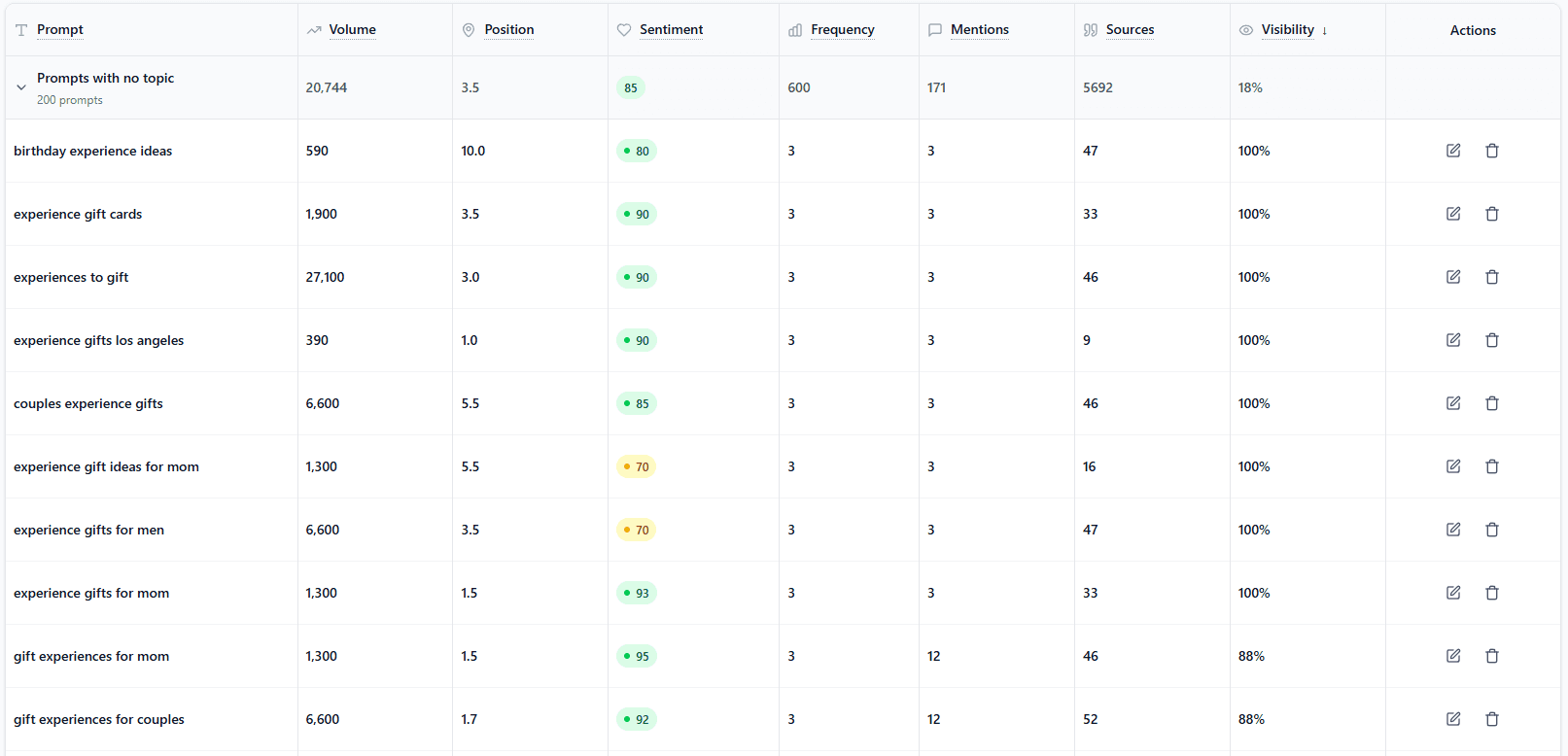
Citation intelligence: We don’t just count mentions. AIclicks pinpoints which external domains get cited, how much traffic do they get, are you mentioned in their content (if yes - are you mentioned high enough?) what kind of page type is it (Reddit? Directory? Listicle? These things really matters) All of this - so you can adjust your strategy effectively.
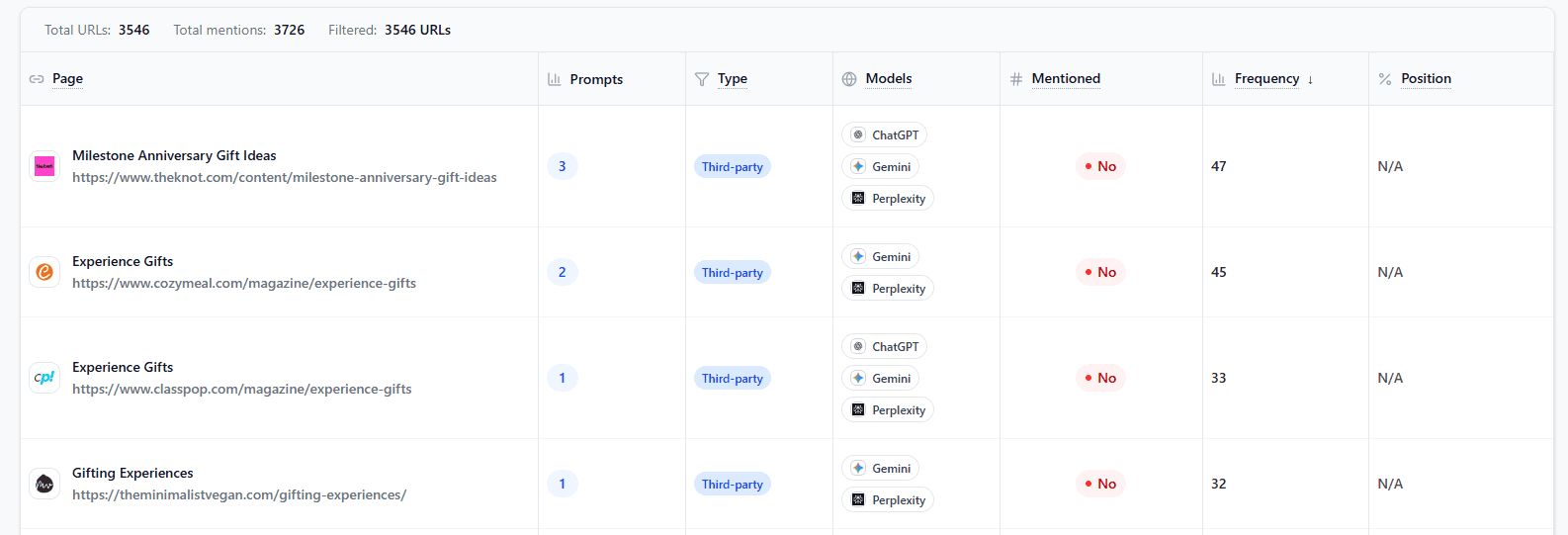
Competitor benchmarking: See which rivals dominate AI answers and where you have gaps.

AI-optimized content creation: Our Write Content module produces answer-ready blogs and guides. Users can tailor drafts to match tone and compliance needs.
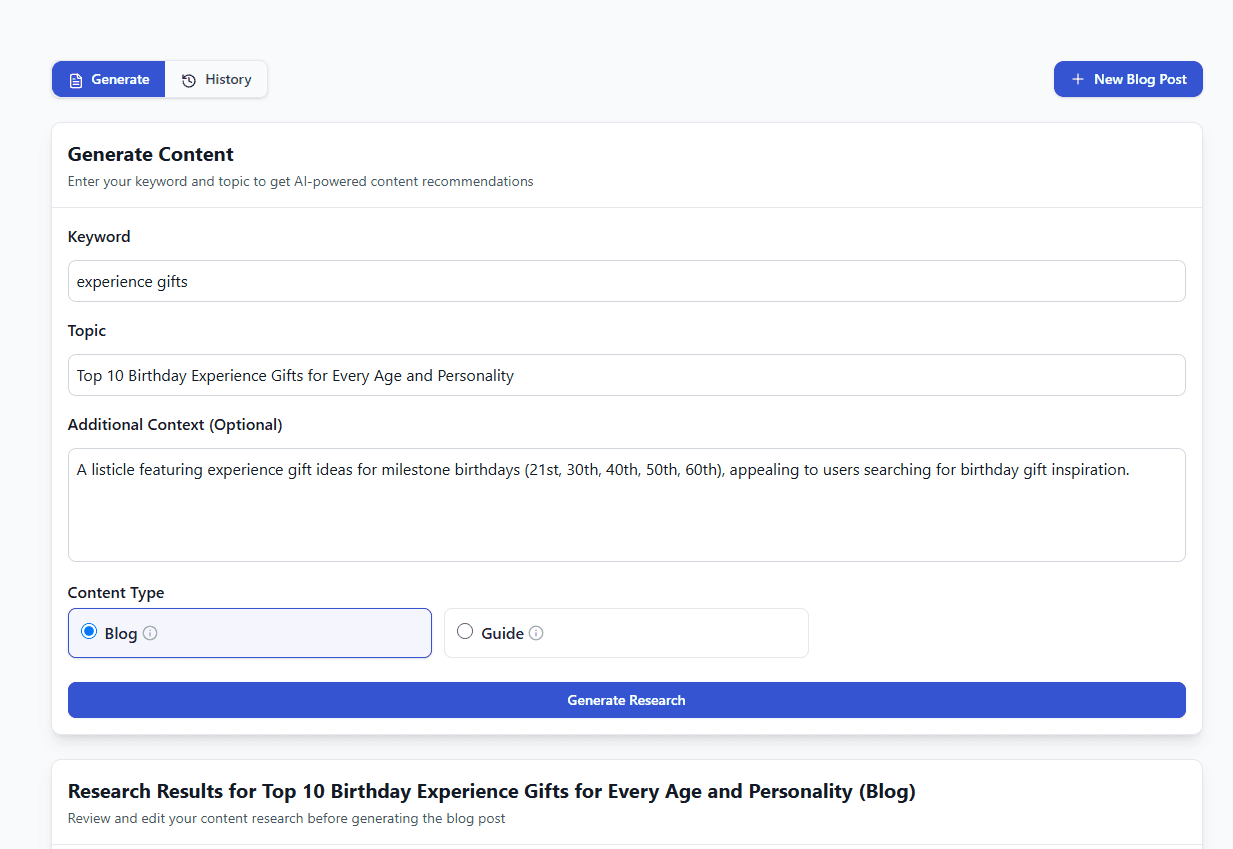
Actionable recommendations: Not just “track and forget” - you’ll get step-by-step suggestions (add LLMs.txt, create specific content, launch a Wikipedia page, etc.).
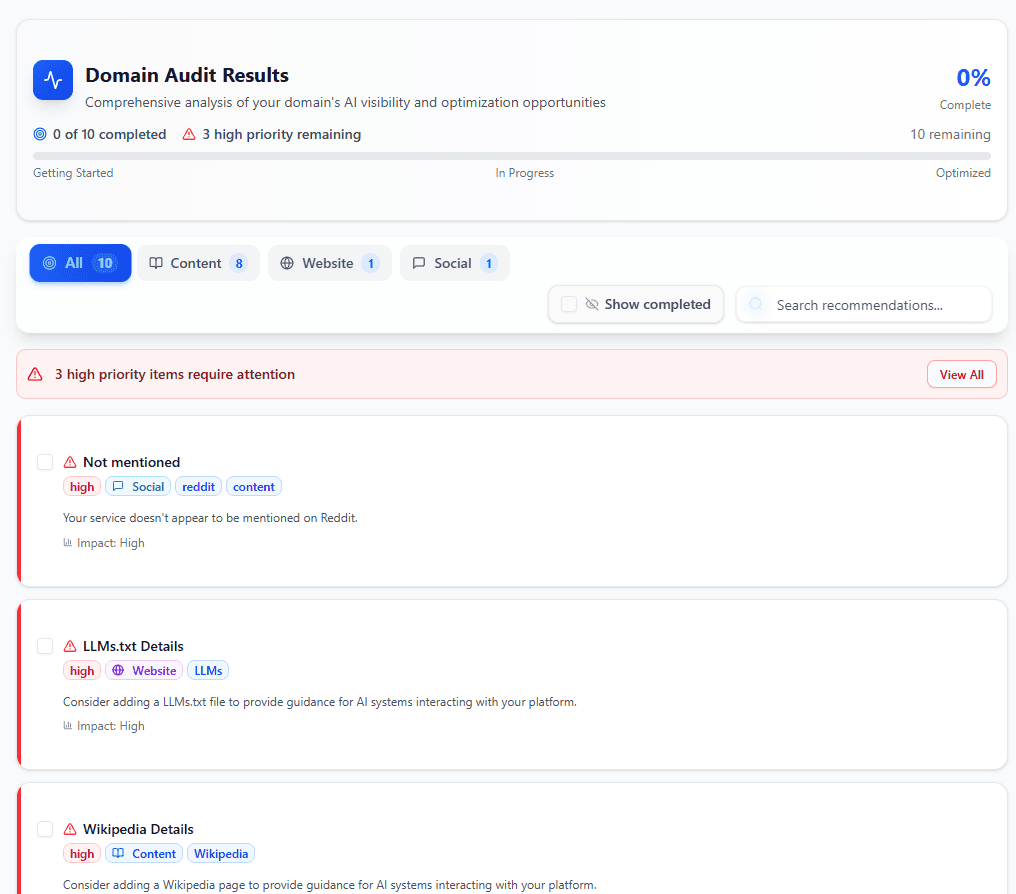
Brand configuration: Customize prompt sets, tone, and market focus so outputs align with your identity.
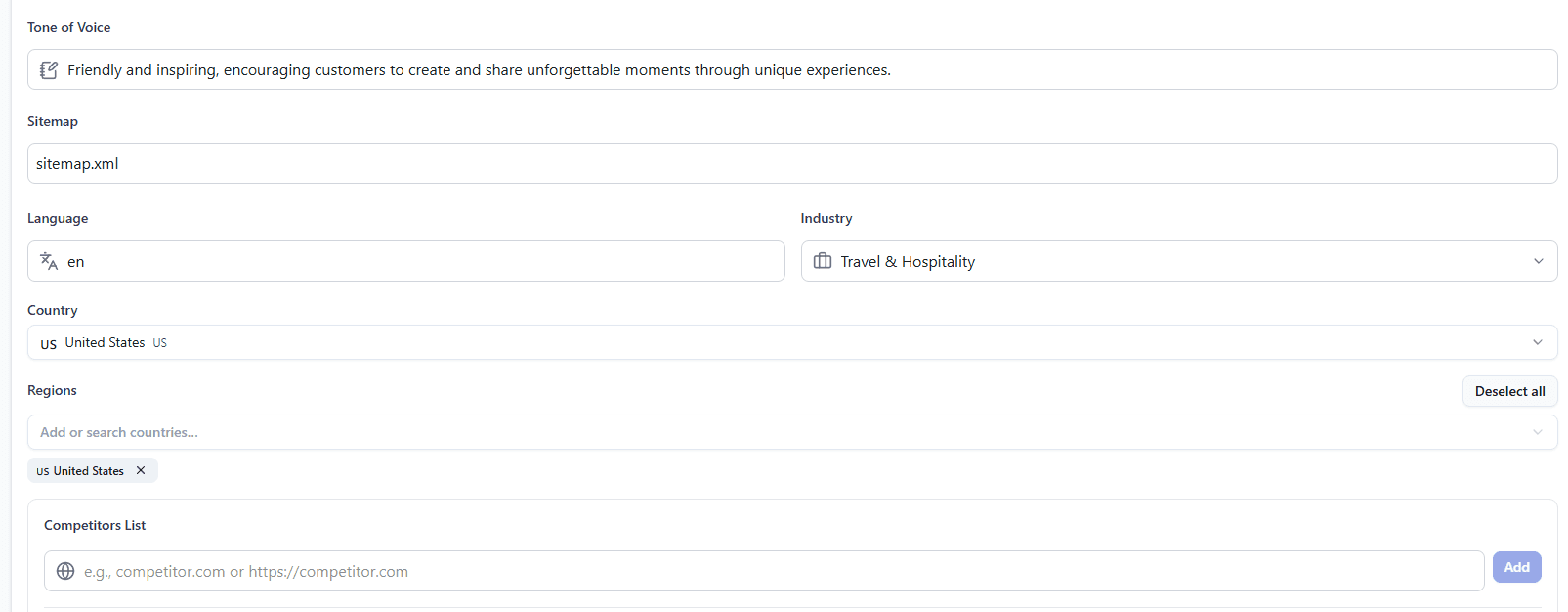
Integrations: Connect with GA4, sitemaps, and IndexNow for full technical coverage.
Pricing: $79/month, yearly discounts, full refund guarantee.
Writesonic
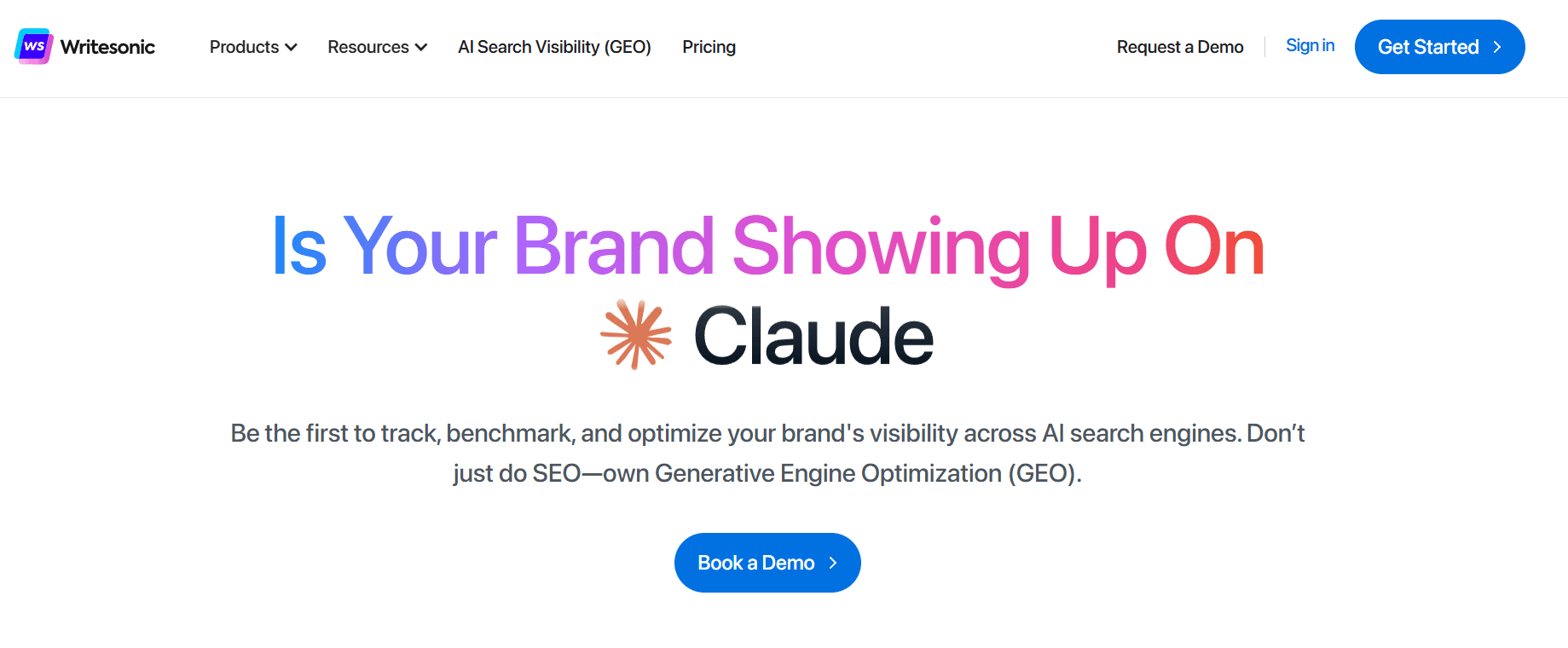
Writesonic combines multi-platform AI visibility tracking with built-in optimization workflows. Its strengths include cross-LLM monitoring, prompt-level insights and automated recommendations that help brands fix citation gaps, content issues and technical blockers. Agencies benefit from multi-client workspaces, while in-house teams get structured GEO workflows that improve visibility across every major AI search system.
Key Features:
Cross-Platform AI Search Tracking: Monitor brand visibility across Google AI Overviews, AI Mode, ChatGPT, Perplexity, Gemini, Claude, and additional LLMs.
Citation & Source Intelligence: See which pages and domains AI systems pull from when referencing your brand, enabling targeted outreach and content updates.
Prompt-Level Analysis: Understand how real user prompts lead to mentions, citations, or missed opportunities across different AI models.
Action Center Workflows: Get prioritized recommendations for content optimization, technical fixes and third-party citation improvement—executed directly inside the platform.
Integrated GEO + SEO Toolkit: Merge AI visibility tracking with SEO and content creation tools, reducing the need for separate systems.
Writesonic is ideal for enterprise and high-growth teams that want AI visibility analytics paired with the tools to take immediate action, making it a strong choice for brands embracing GEO at scale.
GetCito
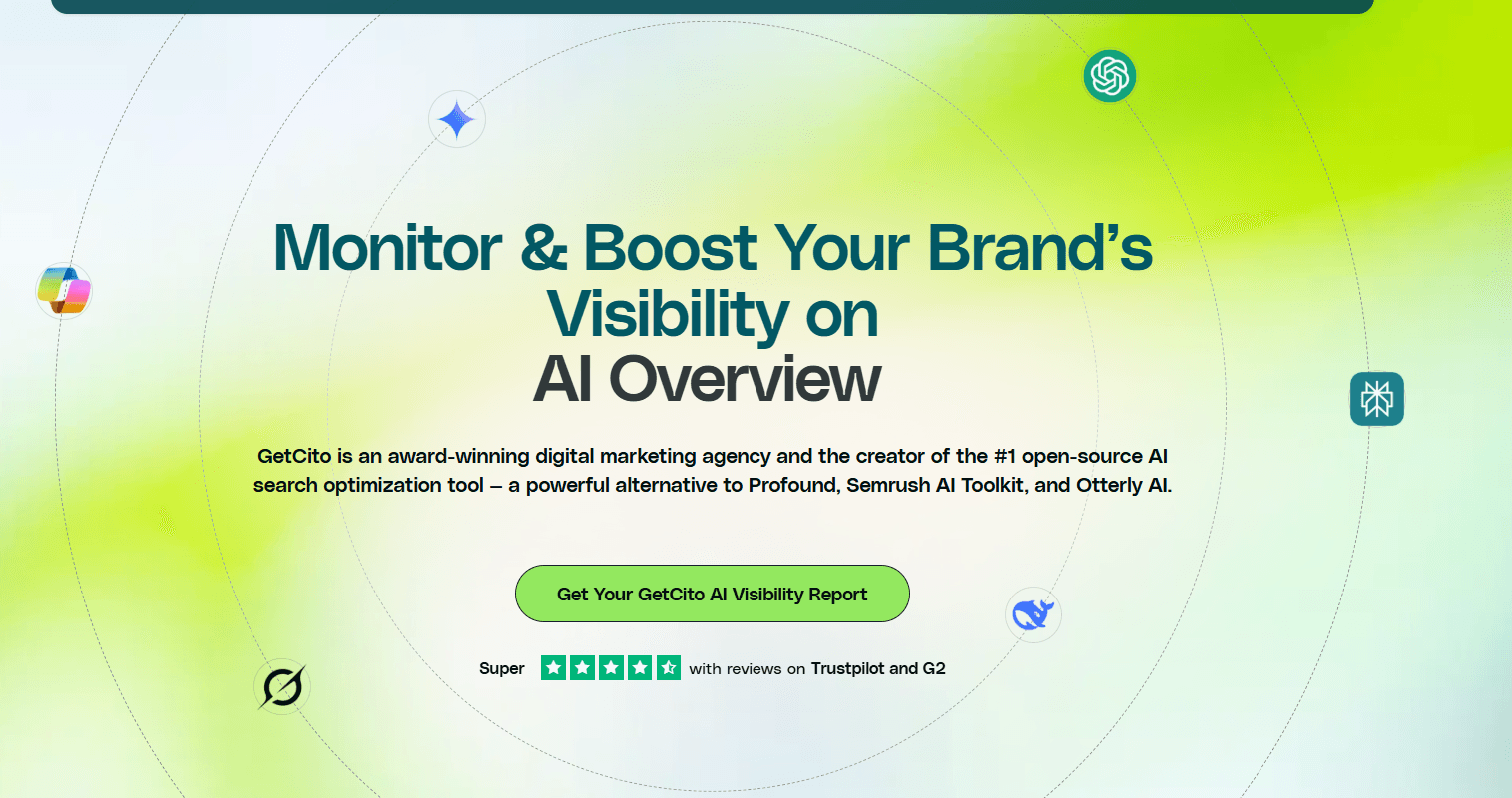
Best for: Data sovereignty, multi‑platform tracking, and universal scalability (from startups to enterprises)
GetCito is built around an open‑source core that gives teams complete control and ownership of their AEO workflows. It focuses on the Retrieval Layer, ensuring your brand is correctly injected into AI knowledge graphs across ChatGPT, Gemini, Claude, Perplexity, Copilot, and other major engines. GetCito features include multi‑platform tracking, competitor benchmarking, a real query database gathered since 2023, and AI traffic analytics that identify which assets drive the highest mentions in AI‑generated summaries.
With streamlined setup and full API access, GetCito balances sovereignty with usability. Pricing is flexible, starting with a free self‑host option, followed by the $19 Starter and $99 Growth tiers.
Goodie
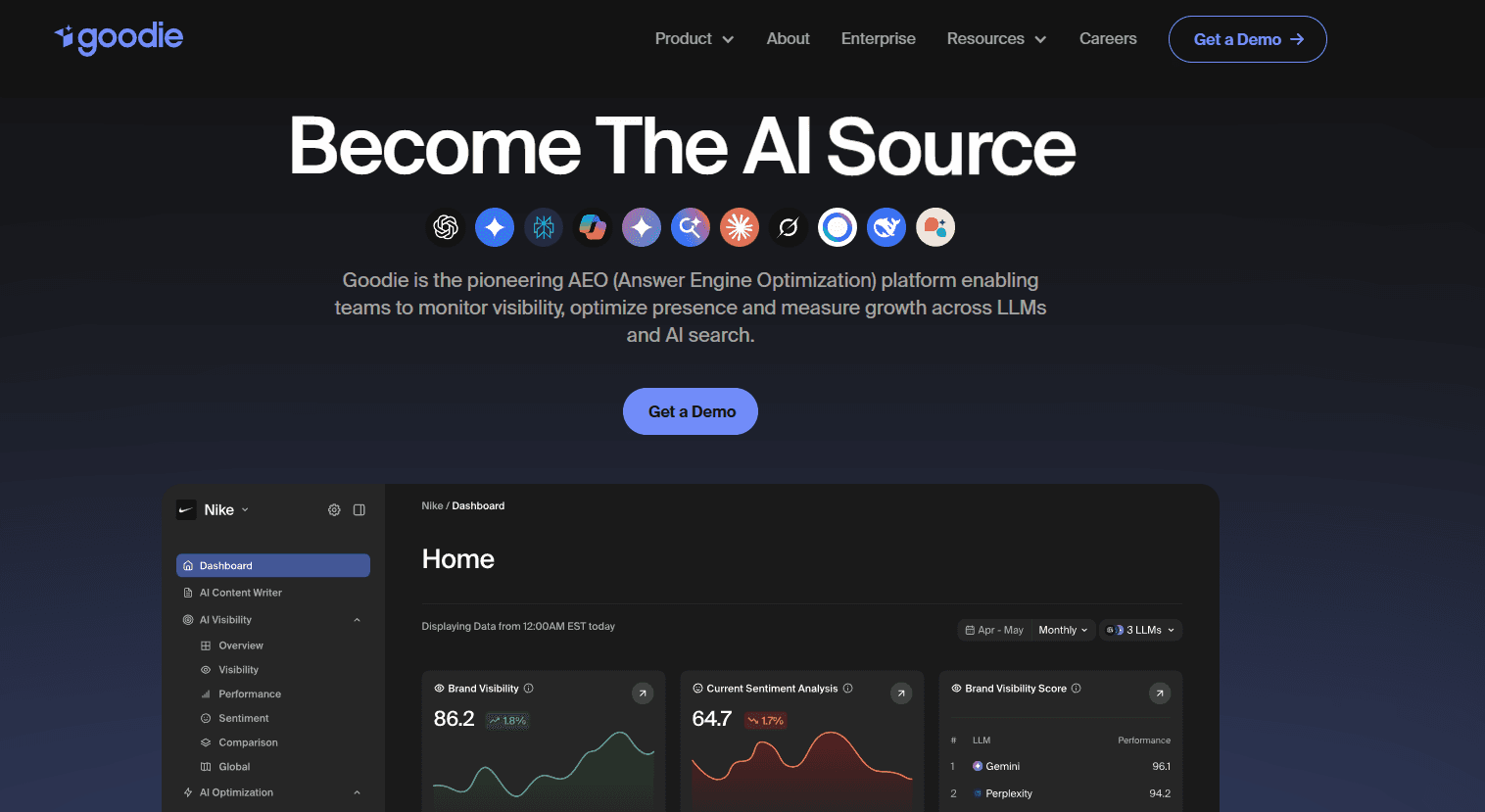
Goodie focuses on complete AI visibility across major answer engines and agent environments, giving teams clarity on when, where, and how their brand appears. The platform captures high-volume prompt testing across multiple LLMs, maps citations and sources, and highlights visibility gaps that require action. Its strength lies in turning AI search insights into direct optimization workflows, helping teams improve discoverability, credibility, and product placement within AI chatbot conversations. The Agentic Commerce Optimizer provides specialized monitoring for product visibility inside AI agents, making it valuable for brands that rely on commerce or lead generation.
Key Features:
High Volume AI Prompt Testing: Evaluate thousands of prompts across 11 LLMs to detect brand mentions, sentiment shifts, and emerging opportunities.
Visibility and Gap Tracking: Reveal where your brand appears, where it is missing, and which queries require updated content or distribution.
Optimization Hub: Convert insights into prioritized actions for SEO, content, and product marketing teams to improve selection and citation frequency.
Citation Intelligence: Understand which sources AI systems reference for your topics and identify pages that influence inclusion or exclusion.
Agentic Commerce Optimizer: Track product visibility inside agents like ChatGPT, Google AI Mode, and Amazon Rufus to improve discovery and conversions.
Goodie is ideal for brands seeking a full cycle AEO workflow, from detection to action and outcome measurement, especially those focused on both informational visibility and commercial performance inside AI systems.
HumanizeAIText.ai
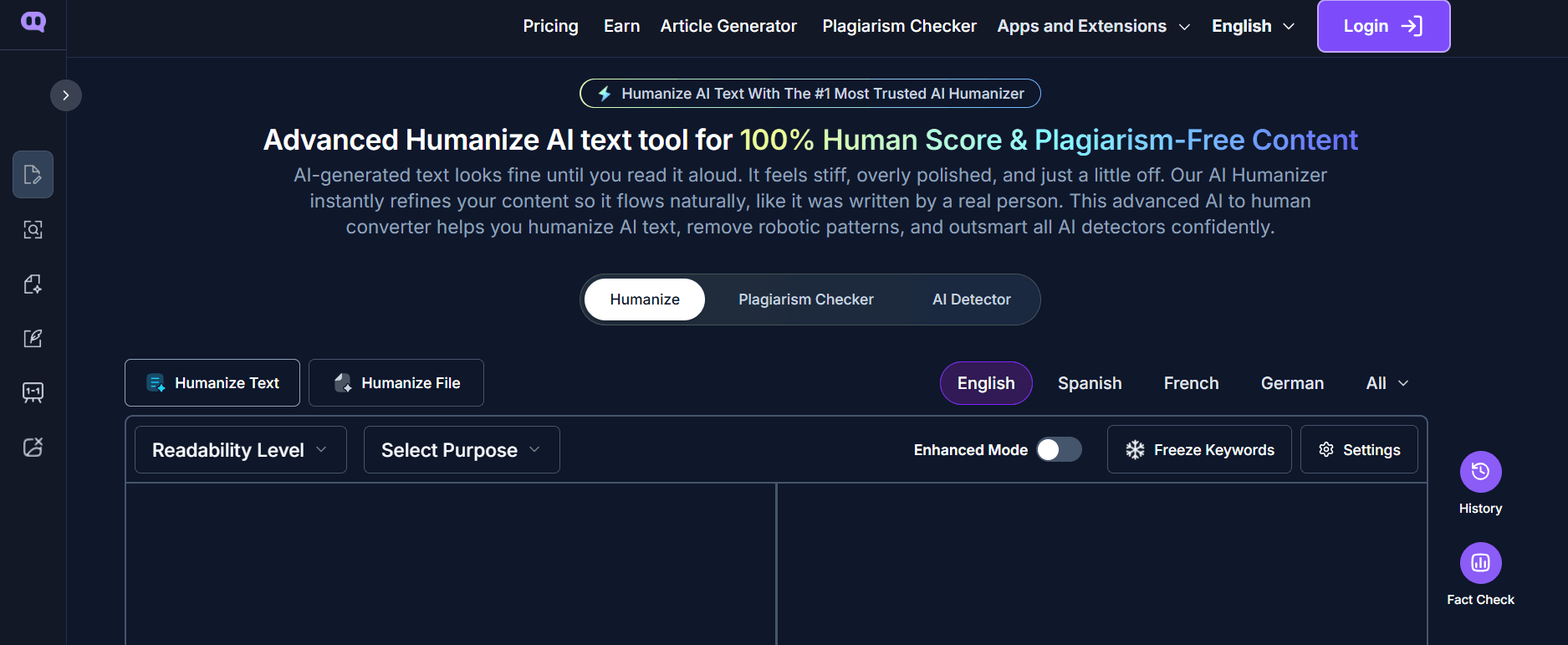
Best for: Making AI-generated content feel natural, improving tone, and reducing robotic phrasing
Humanize AI Text tool is designed to polish AI-generated writing so it reads more like something written by a person, not a prompt. Instead of focusing on SEO structure or keyword targeting, it concentrates on refining tone, flow, and phrasing—making it especially useful for creators, educators, and marketers who need AI-assisted drafts to sound clear, authentic, and human.
The tool works with output from ChatGPT, Claude, Gemini, and other major models. It doesn’t generate text from scratch or rely on scraping data, but instead reworks what’s already written. With a clean interface and quick processing, HumanizeAIText.ai is a lightweight but effective addition to any AI content workflow.
The tool is free to use with optional advanced features, making it accessible for casual users and professionals alike."
Profound

Profound offers granular keyword and prompt-level tracking. Its strengths are conversion explorer, competitive benchmarking, and specialized features for shopping AI optimization. White-glove consulting is available for larger brands needing tailored strategies.
Key Features:
Comprehensive AI Search Visibility Tracking: Monitor your brand's presence across major AI platforms like ChatGPT, Perplexity, and Google AI Overviews.
Citation Tracking: Identify which sources are contributing to your brand's AI mentions, allowing for targeted content strategies.
Competitor Benchmarking: Analyze your brand's performance in comparison to competitors, uncovering opportunities for improvement.
Content Optimization Recommendations: Receive actionable insights to enhance your content's performance in AI-generated responses.
Enterprise-Grade Integrations: Seamlessly integrate with existing tools and data sources, streamlining workflows.
Profound is ideal for enterprises requiring comprehensive AI visibility analytics and strategic optimization.
Peec AI

Peec AI focuses on multi-country LLM reporting and opportunity ranking. Teams get detailed prompt/source mapping and flexible, modular pricing that adapts to different coverage needs.
Key Features:
Brand Visibility Tracking: Monitor how frequently your brand appears in AI-generated responses across multiple platforms.
Analytics & Reporting: Gain insights into your brand's performance across different AI platforms, identifying areas for improvement.
Competitive Intelligence: Benchmark your brand's visibility against competitors, uncovering opportunities to enhance your presence.
Content Optimization: Identify opportunities to enhance your content for better AI visibility, improving user engagement.
Integration Capabilities: Easily integrate with existing tools and platforms, streamlining workflows.
Peec AI is ideal for marketing teams looking to understand and improve their brand's presence in AI search engines.
Scrunch AI

Scrunch AI delves deep into the AI search landscape, uncovering how your brand is represented across platforms like ChatGPT, Gemini, and Perplexity.
Key Features:
Competitive Position Tracking: Compare your brand's visibility with competitors in AI responses, identifying strengths and weaknesses.
Actionable Insights: Identify content gaps, misinformation, and outdated data that may affect your brand's performance in AI search.
Persona & Prompt Intelligence: Support for persona and geography-based tracking, allowing for tailored monitoring strategies.
Bot Traffic Monitoring: Track which AI crawlers are accessing your pages and what content they're retrieving, ensuring proper indexing.
Integration with Content Platforms: Seamlessly integrate with content creation tools, streamlining optimization efforts.
Scrunch AI is suitable for enterprises aiming to optimize their brand's representation in AI-generated search results.
AthenaHQ

AthenaHQ stands out for brand monitoring and crisis management. Unlimited user seats, multi-brand dashboards, and free reports make it a practical choice for agencies needing robust sentiment tracking.
Key Features:
AI Visibility Monitoring: Track your brand's presence across major AI search engines, including ChatGPT, Perplexity, and Google AI Overviews.
Personalized AI Content Optimization: Optimize your content for better performance in AI-generated responses, enhancing user engagement.
Competitor Monitoring: Analyze how your competitors are performing in AI search results, uncovering opportunities for improvement.
Role-Based Access Control (RBAC): Manage user access and permissions within the platform, ensuring secure collaboration.
Integration Capabilities: Easily integrate with existing tools and platforms, streamlining workflows.
AthenaHQ is ideal for agencies and larger teams seeking comprehensive AI search optimization tools.
Rankscale AI

Rankscale AI focuses on Generative Engine Optimization (GEO), providing deep insights into brand performance across AI search platforms.
Key Features:
AI Search Engine Tracking: Monitor brand performance across various AI search platforms, including ChatGPT, Perplexity, and Google AI Overviews.
GEO (Generative-Engine-Optimization): Optimize content for AI-driven search results, enhancing visibility and engagement.
Visibility Analytics: Gain insights into how your brand appears in AI search outputs, identifying areas for improvement.
Citation Analysis: Track which sources are contributing to your brand's AI mentions, allowing for targeted content strategies.
Competitive Benchmarking: Analyze your brand's performance in comparison to competitors, uncovering opportunities for optimization.
Rankscale AI is suitable for marketing, SEO, and product teams requiring structured visibility reporting and daily insights into their performance in AI-generated search results. RankScale.ai

Otterly.ai offers a user-friendly platform for startups and small businesses to monitor their brand's visibility across AI search engines.
Key Features:
AI Visibility & Tracking: Monitor brand mentions and website citations on AI search engines like ChatGPT, Perplexity, and Google AI Overviews.
Sentiment & Brand Analysis: Analyze the sentiment of AI-generated content mentioning your brand, understanding public perception.
Search Prompt Monitoring: Track how your content performs for specific search prompts, identifying opportunities for optimization.
Competitive Benchmarking: Compare your brand's performance with competitors, uncovering areas for improvement.
Integration Capabilities: Easily integrate with existing tools and platforms, streamlining workflows.
Otterly.ai is designed for startups and small businesses needing simple insights into their brand's performance in AI search engines.
Mentions.so

Mentions.so is a streamlined tool designed to track and improve how your brand is mentioned in AI responses.
Key Features:
Brand Mention Tracking: Monitor how your brand is mentioned across AI search platforms, including ChatGPT, Perplexity, and Google AI Overviews.
Prompt Suggestions: Receive suggestions for prompts that can enhance your brand's visibility in AI-generated responses.
Sentiment Analysis: Understand the sentiment of AI-generated content mentioning your brand, gaining insights into public perception.
Competitive Benchmarking: Compare your brand's performance with competitors, identifying areas for improvement.
Integration Capabilities: Easily integrate with existing tools and platforms, streamlining workflows.
Mentions.so is ideal for individuals and small teams seeking a straightforward tool to track and improve their brand's presence in AI search engines
Rank Prompt
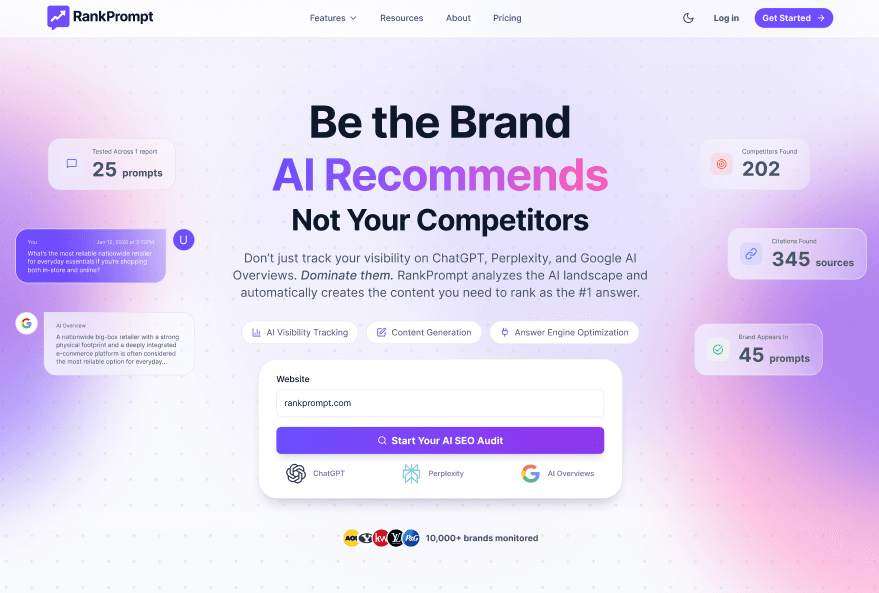
Rank Prompt is an AI visibility and Answer Engine Optimization (AEO) platform designed to help brands understand how they appear inside AI-generated answers across tools like ChatGPT, Gemini, Perplexity, and Google AI Overviews. Instead of relying on traditional keyword rankings, RankPrompt evaluates real, user-style prompts to determine whether a brand is mentioned, how prominently it appears, which competitors are cited, and which sources influence those responses.
Technical Specifications
AI platform coverage: Tracks brand visibility across ChatGPT, Gemini, Perplexity, and other AI-driven search and assistant experiences.
Prompt-based reporting: Measures brand mentions, competitive presence, and visibility trends across scheduled and historical prompt runs.
One-click multi-location tracking: Designed for franchises and multi-location businesses, RankPrompt allows teams to track AI visibility across multiple regions or countries with a single configuration. The same prompt set is automatically applied to each location, enabling fast, side-by-side comparisons of how different branches appear in AI-generated answers.
Content generation & publishing: Includes a trained content generation agent that converts AI visibility gaps and missed prompts into publish-ready articles. RankPrompt integrates directly with WordPress, allowing teams to draft, edit, and publish content based on real AI prompt data without leaving the platform.
White-label exports: Generate branded PDF reports combining AI visibility, SEO data, analytics, and citation insights for client-facing use.
Analytics & SEO integrations: Connects with Google Analytics and Google Search Console, and includes technical SEO audits, content analysis, and on-page diagnostics.
Citation intelligence: Enriched citation data surfaces the sources influencing AI answers, including metadata and preview details for referenced pages.
Collaboration & reporting: Supports collaborators, dashboards, quick reports, and scheduled monitoring for ongoing visibility tracking.
Pricing
RankPrompt offers tiered pricing based on usage credits and feature access, with plans starting at approximately $49/month. Higher-tier Pro and Agency plans include additional credits, multi-brand management, collaboration features, and white-label reporting.
Reviews & Market Reception
RankPrompt is listed on G2, where it currently holds a 4.3 out of 5 rating based on early user reviews. Reviewers highlight the platform’s prompt-based tracking approach, clarity into why brands do or do not appear in AI answers, and the ability to connect AI visibility insights directly to content and citation strategy.
Why AI Visibility Is Critical for Brands
Let’s be clear. Traditional SEO aimed to get your site on page one of Google. But AI search means models pull from authoritative sources and synthesize answers - sometimes without linking back. That means if your brand isn’t showing up in the answer itself, users might never know you exist.
Here are three key reasons to focus on AI visibility:
Direct brand influence. Users trust AI summaries and answers, whether in ChatGPT, Gemini, or Bing Copilot.
New customer journeys. Many buyers now start with a chatbot instead of a search bar.
Competitive edge. Showing up in AI-generated results means you’re front and center, not just another blue link.
To learn more, read about key differences between SEO and AI SEO
How to Evaluate AI Brand Visibility Optimization Tools
Picking the best AI visibility tracking tool isn’t just about shiny dashboards. From my own journey building AIclicks for clients across e-commerce, SaaS, and agencies, I’ve learned the must-haves:
Prompt-Level Tracking and Dashboards: You want to watch which questions get your brand mentioned, and how often, across multiple models.
Multi-Engine Coverage: The best tools cover ChatGPT, Perplexity, Gemini, Claude, and other engines. Each answers users differently.
Reliable Data Collection: API-based is better than scraping - more transparent, less likely to break, and gives cleaner results.
Which metrics matter most? Consider citations' organic traffic metrics, number of prompts mentioned in different citations, share of voice, sentiment analysis.
Citation and Source Analysis: Track what domains and URLs AI platforms recommend and why.
Competitor Benchmarking: Compare your “share of voice” and see who’s winning the conversation.
Content Recommendations: The most powerful feature, in my eyes, is not just tracking but showing you how to fill gaps - like rewriting pages or adding authority signals.
Integrations: Connect with existing analytics and reporting tools for a full picture.
Scalability and Support: Good platforms should work for small teams up to big enterprises.
Honestly, in my experience, any tool that just plots your citation numbers but leaves you guessing how to fix things misses the point.
How to Choose the Right AI Search Visibility Optimization Platform
So how do you pick? Here’s what I advise clients at AIclicks:
Business Size and Goals: Large enterprise needs deep integrations and team tools. Solo founder? Look for simplicity and affordability.
AI Coverage: Make sure your audience uses the platforms your tool monitors.
Data Depth: Does the platform just show dashboard numbers, or does it guide you step by step?
Citation and Competitor Insights: You want clear visibility on what’s driving AI answers - for both you and your competitors.
Content Optimization: The best value comes from suggestions that help you rewrite, rebuild, and get referenced more often.
Analytics Integrations: Consider how easily you can plug in with GA4, CMS, etc.
Reviews and Support: Don’t underestimate the peace of mind from solid support.
Scalability: Your solution should grow with your brand; don’t lock yourself into tools you’ll outgrow.
A quick checklist before you subscribe: Audit your own visibility, map your prompt landscape, set measurable goals, and preview the platform’s reporting features.
A Webinar Case Study of our Client
Recently, we've launched a case study showing the exact case how a brand can use an AI visibility tool and gather unique insights that could help increase it's traffic from AI.
This is the exact flow we showed in the webinar: baseline → gaps → fixes → re-measure - repeated until AI traffic and conversions climb:
Set the baseline: Audit current AI visibility (where your brand is cited across ChatGPT, Copilot, Perplexity, Gemini).
Map revenue prompts: List the commercial questions that drive money in your niche; group them into clusters.
Benchmark competitors: Compare share-of-answer, citation sources, and placement within lists.
Find gaps: Identify prompts, engines, or source types (reviews, listicles, forums) where you’re missing or weak.
Ship fixes:
On-site: add answer-first intros, tables, and internal links; ensure SSR and clean HTML.
Off-site: secure directory/review listings and higher placements in relevant listicles; engage key Reddit threads.
Unblock crawling: Confirm robots.txt allows target AI/search bots; keep sitemaps fresh; use GSC + Bing WMT/IndexNow.
Monitor weekly: Track prompt/brand positions, new/changed cited sources, and AI referrer traffic.
Measure ROI: Tie changes to conversions/revenue; double down on clusters and sources that move the needle.
Best Practices and Tips for AI Brand Visibility
If you want to build “AI discoverability,” here’s what works:
Clear, conversational, answer-first intros. The easiest way to get “lifted” is to start every guide or blog with a two-sentence solution to the main question.
Organize with bullets and tables. LLMs love clarity. If your page is a messy wall of text, odds of citation plummet.
FAQs at the end. These provide ready-made chunks for AI engines to grab.
Allow AI crawlers by updating your robots.txt and LLMs.txt files.
Don't hide key content via JavaScript
Regularly refresh content to keep it “fresh” for AI models.
Authority signals. Get your brand mentioned on authoritative directories, trusted review sites, and active forums like Reddit. I’ve seen direct traffic spikes after getting a product added to a “Best X” listicle.
Schema markup and LLMs.txt. These technical signals help AI crawlers index your content the right way.
Topic clusters. Create comparison pages and topical hubs for authority.
I’ve watched brands unlock 40% more visibility by simply getting cited on Wikipedia and Reddit forums. The lesson? It’s about proactive authority, not just passive page building.
👉 We have a dedicated blog post about how to rank in AI search results, this might help to better understand best practices
Conclusion
AI search visibility optimization is now mission-critical. Every month, tools and engines shift - don’t let your brand get buried behind the algorithmic curtain. Start small: track your mentions, get actionable recommendations, and build content designed for answer engines. If you’re ready to benchmark your AI presence, test out a free audit or demo from leading platforms such as AIclicks.io. It’s time to be seen right where customers are looking next.
FAQs About AI Optimization Tools for Visibility
What is AI visibility?
AI visibility measures how often and how favorably your brand is featured in AI-generated answers, not just classic search results. As user queries move to LLMs like ChatGPT and Perplexity, appearing in those answers builds trust and preference. Track mentions, citations, and context to map your real influence.
What are the best AI search optimization tools for improving brand visibility?
The best AI search optimization tools are those that track how often your brand appears inside AI-generated answers and provide guidance to improve that visibility. Leading platforms in 2026 include AIclicks.io, Profound, Peec AI, Scrunch AI, AthenaHQ, Rankscale AI, Otterly.ai, and Mentions.so. These tools monitor prompts, citations, and brand mentions across ChatGPT, Perplexity, Gemini, Copilot, and AI Overviews — helping you understand where you’re winning, where competitors dominate, and how to improve your share of voice. You can read more about How to Choose the Right AI Search Tool.
Why choose AI search visibility monitoring tools?
AI search visibility tools are essential because buyers increasingly start their journey with AI engines instead of Google. These tools reveal whether your brand appears in AI answers, which sources models cite, and how users perceive you in generated summaries. By monitoring prompts, citations, and sentiment across LLMs, you can identify gaps, improve authority signals, optimize content, and stay competitive in AI-driven discovery environments.
Who provides actionable insights on improving competitive rankings in AI search platforms?
Platforms like AIclicks.io, Profound, and Scrunch AI stand out for offering actionable, step-by-step recommendations — not just tracking. They analyze citation sources, identify which competitors dominate specific prompts, highlight missing authority signals, and provide guidance such as creating targeted pages, optimizing FAQs, improving structured data, or securing mentions on authoritative third-party sites. These insights help brands systematically climb higher in AI-generated rankings and improve overall visibility.
How do you optimize AI content?
Use AI-powered platforms to find keywords, rewrite for clarity, boost authority, and plug content gaps. Pair machine insights with human review for balance. Combine generative optimization (structuring for AI) with regular SEO tactics to keep content adaptable.
How to appear in ChatGPT results?
Answer user questions directly, build authority, index your site with Bing/OpenAI, and get cited on trusted sources. Structured FAQs, schema markup, verified stats, and a strong online reputation all help. Actively ask chatbots about your brand to spot gaps. Read more here about how to appear in ChatGPT results
How to track AI visibility?
Use platforms like aiclicks.io for keyword-based AI visibility tracking. Match your brand mentions and links to target queries, see where you land in AI answers, and monitor trends by platform and geography.
Our Content:
Guide
How to Use Perplexity AI (Like a Pro) in 2026
Feb 12, 2026
Guide
How to Get Backlinks to Your Site in 2026
Feb 12, 2026
Tools
8 Best AI Search Engines in 2026
Feb 12, 2026
Tools
9 Best LLM SEO Tools for 2026 (and how to pick the right one)
Feb 12, 2026
Tools
10 Best LLM Optimization Tools in 2026
Feb 12, 2026
Tools
9 Best tools for tracking LLM visibility in 2026
Feb 12, 2026
Any questions left?
Book a call here:







